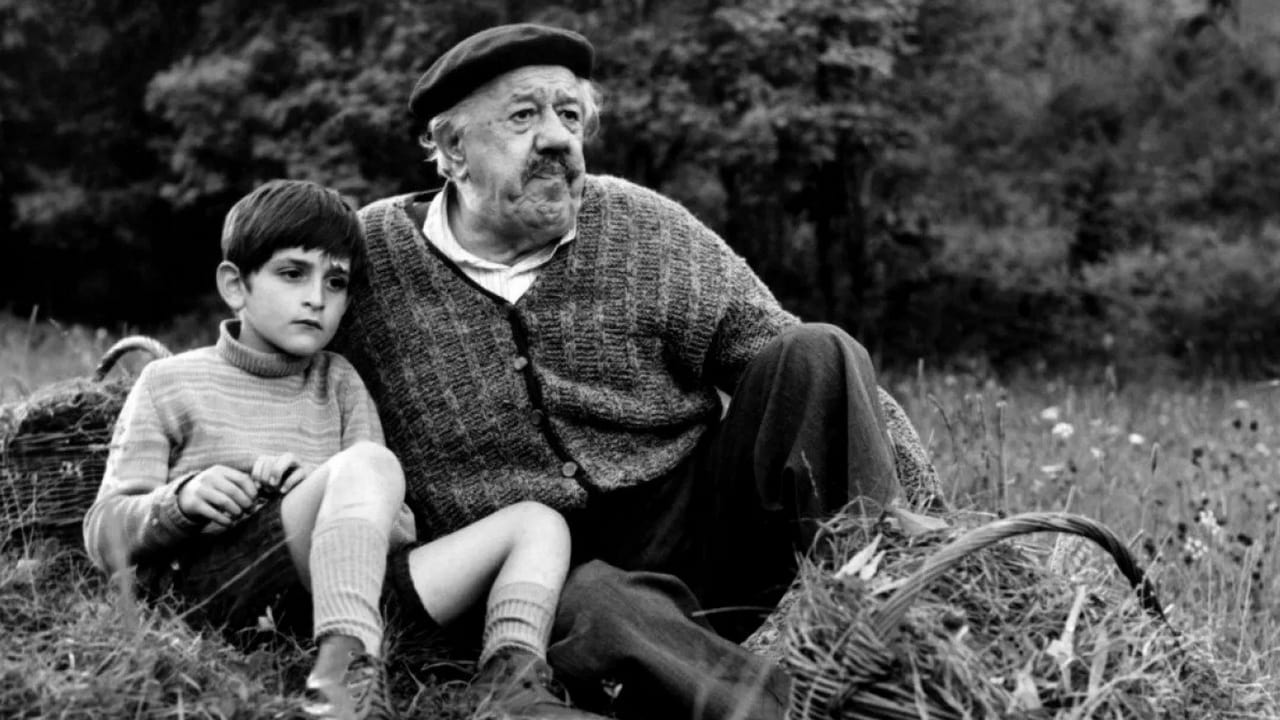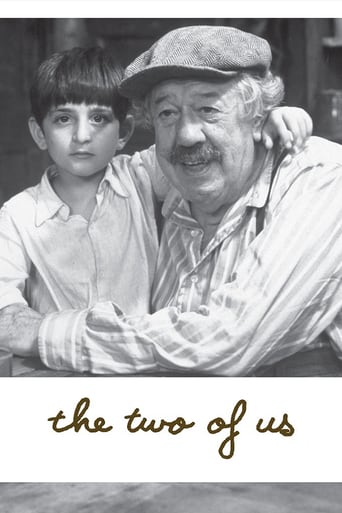Laikals
The greatest movie ever made..!
SeeQuant
Blending excellent reporting and strong storytelling, this is a disturbing film truly stranger than fiction
Hadrina
The movie's neither hopeful in contrived ways, nor hopeless in different contrived ways. Somehow it manages to be wonderful
Brooklynn
There's a more than satisfactory amount of boom-boom in the movie's trim running time.
maurice yacowar
Claude Berri's The Two of Us (1967) proves two critical axioms. (i) A period film is as much about the time it is made as the time it is set. Why else tell it now? The very best are also about the time they're seen, even decades later. They tap into a continuing, profound truth that transcends the original incident. (ii) The most effective treatment of a large theme is a small, intimate story. Then an issue gets an emotional address in human terms, not abstractions.(i) In 1967 Claude Berri described the loving relationship that develops around 1944 between an 8-year-old Jewish boy -- sent for refuge from occupied Paris to the countryside -- and Pepe, the antisemitic old man who hosts him. Pepe becomes the boy's Gramps. As the old Petainiste spouts the clichés of French antisemitism he personifies a tradition that extends from the Dreyfuss Affair to the Nazi collaborators — and down to today, the recent slaughters in Paris and the government's detachment from Israel. As Berri taps a deep and resurgent vein in French culture his film feels as current now as it did in 1967.(ii) This small humorous story illuminates the global tragedy of antisemitism, as large a topic as one can undertake. Little Victor is a charming miniature of The Jew. He's bright enough to trounce the old man's adult son at checkers — consistently. He's disciplined enough to hide his Jewishness (his circumcision as well as his name) from the country folk. His attempts to fit in — courting a neighbour's blonde daughter — end in his humiliation. A city schoolmate calls him a dirty Jew. The rural kids don't know he's Jewish but bully him anyway, for no reason other than they consider him an outsider. That's the basis of the Jew's perpetual persecution. But Victor also has the Jew's indomitable spirit. In the city he gets into trouble by refusing to accept the inhibitions his frightened parents feel and try to impose. He won't be intimidated or suppressed. He impishly probes old Pepe's prejudice, urging him to spout the stereotype then charging the old man with the very qualities he declared Jewish. He calculates how to get to share the old couple's bed the way he did his parents'.The ending is poignant. After Liberation Pepe feels "the world has passed me by." His beloved Petain is defeated and the nations he considers France's enemies have won the war. His dear old dog has died, his son has turned against his politics and his authority, and now he loses the lad he has come to love. Pepe and his wife stand in the rain as the bus taking away Victor and his parents drives off, their faces against the back window. Pepe doesn't have to reconsider his antisemitism in the light of his love for Victor. We know the boy loved him, despite that prejudice. He felt the old man's love despite his words. Pepe has an emotional connection truer than the bigoted myth he believed.The film has a nostalgic feel, confirmed by the fact Director Berri gives young Victor his own family name: Langmann. The English title seems an improvement on the French original. "The Old Man and the Boy" suggests an outside perspective on the pair. "The Two of Us" speaks from within the two -- for either one. The English title emphasizes the connection, the French their difference. Sad to say, recent events suggest the world has not passed the old bigot by after all.
MartinHafer
So much of this film is wonderful. The acting, dialog and writing are very good and I liked the movie very much. However, when the movie ended, it seemed to be missing a few things--and felt a tiny bit incomplete.The film begins during WWII in German occupied France. A Jewish family has been moving about the country and keeping a low profile in order to avoid problems with the fascist government. However, the little boy (who looks about five) has a tendency to get noticed and the parents are worried that his antics will endanger them all. So, they make the heartbreaking decision to have him live with a Catholic family and have him pose as a Christian. The only problem with this plan is that the elderly couple, though very good in most ways and very willing to care for the child, have no idea the kid is a Jew--and the old man hates Jews! This was not all that rare a thing at that time, but it was interesting that the couple had no idea the kid was Jewish--yet they came to love him as their own. In particular, the very anti-Semitic old man really came to love the kid--an oddly ironic situation. It's funny, but on one hand the old man is like Archie Bunker from "All in the Family"--full of hateful prejudices and very set in his ways. Yet, strangely, it was hard to hate the guy--he was often quite sweet and a real character--played wonderfully by veteran Swiss actor Michel Simon (who was at his absolute best here). Plus they did, inadvertently, save the kid's life.What bothered me is that there was never any revelation or resolution in the film. At one moment, the kid was living with the couple and listening to the anti-Semitic rants of the old man (and by this point, the kid also began to hate Jews). The next, the war was over and the kid is instantly shown leaving with his parents. Did the man ever learn that this kid he loved was a Jew? Did his sick views ever moderate or change? How difficult was it for the child to leave or the couple to let him go? Did the kid have any problems reconciling his love for the man yet dealing with the ugliness of his prejudices? All this is left unanswered, as the film literally looks like a chunk of it was missing at the end. Because of this, the film loses a couple points and left me feeling frustrated--I had really loved it up until then. But with no resolution, this can't be a perfect film.By the way, this film was the first full-length film by Claude Berri. It's on a DVD from Criterion that also includes Berri's first short, the Oscar-winning "The Chicken". A very, very good package.
writers_reign
Claude Berri has been gracing French cinema as Producer, Writer, Actor and Director for several years and it's a given that at least two or three of his movies are on every discerning viewer's 'Best' list and I don't necessarily mean the obvious, i.e. Jean de Florette and its other half Manon but things like Lucie Aubrac which is also set in Occupied France as is this gem. The idea of teaming a Senior Citizen with a child is far from new and far from played out, witness Papillon less than a decade ago, but it is, by definition, tricky and the trick is in finding a suitable child. Berri struck oil with Alain Cohen and all he had to do was pair him with Michel Simon and the movie practically made itself. That, of course, is the impression an audience gets when a master filmmaker like Berri is on bullhorn. I can add little to the praise, merely second it. A great movie.
mllelarisa
I caught this at the local art museum, what a treasure it is! I became interested because the director is Claude Berri, and his "Jean de Florette/Manon des Sources" story is one of my favourites of all time. Although this movie is in black and white, it's a superior quality and beautiful to watch. The story, of a little Jewish boy hiding out in the country with an anti-semitic old man in occupied France, could easily have gone down the path of sadness and tears, but instead it is a joyous movie full of laughter and love. I must say Michel Simon is a delightful actor, and makes even a narrow-minded, ignorant, brainwashed old man like Pépé a kind, fun grandpa that any child would love to have. I believe this movie is based on Claude Berri's actual experience, but I did have to wonder at the end if Pépé was ever told the truth about the child's heritage and if so, did it matter? Anyway, this is a fantastic heartwarming movie that you shouldn't miss if you ever get the chance to see it.

